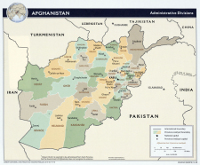Coalition special operations forces killed the Taliban’s shadow governor for the northwestern province of Faryab yesterday.
Qari Ziauddin, the shadow governor for Faryab province, was killed in a “precision airstrike” on Oct. 5 after Coalition forces tracked him “to a remote area of Dowlatabad district,” the International Security Assistance Force stated in a press release.
A joint Coalition and Afghan assault force followed up the strike, and killed four Taliban fighters in a firefight. The team was able to confirm that Ziauddin had been killed in the airstrike.
The joint forces also discovered a large cache of weapons, ammunition, and IED materials while searching a series of nearby caves. The weapons and ammunition caches were destroyed.
Ziauddin, like many other Taliban leaders throughout Afghanistan, took his marching orders from the Taliban’s leadership councils based across the border in Pakistan. He “was directly associated with and took direct operational orders from a Pakistan-based leader of the northern front,” ISAF stated.
The Taliban in the north receive orders from the the Peshawar Shura, one of the Taliban’s four major regional commands for Afghanistan. All four of the Afghan Taliban’s regional shuras are named after and based in Pakistani cities in Khyber-Paktunkwa or Baluchistan.
The Peshawar Shura is based out of the Pakistani city of Peshawar, which is the provincial capital of Khyber-Paktunkwa. The Peshawar Shura is thought to be led by Taliban commander Abdul Latif Mansur, who replaced Maulvi Abdul Kabir, who is said to have been detained by Pakistan’s intelligence service.
The Taliban establish shadow or parallel governments in the regions they control or where the Afghan government is weak. These shadow governments fill the void by dispensing sharia justice; mediating tribal and land disputes; collecting taxes; and recruiting, arming, and training fighters.
The Taliban have established shadow governments throughout Afghanistan, with provincial and militarily leaders appointed to command activities. In January 2009, the Taliban claimed to be in control of more than 70 percent of Afghanistan’s rural areas and to have established shadow governments in 31 of Afghanistan’s 34 provinces.
Coalition and Afghan forces have targeted the Taliban’s shadow government in the north hard this past year, with several commanders killed or captured [see LWJ report, Coalition continues pursuit of IMU commanders in the Afghan north, for more information]. Just yesterday, a wanted district shadow governor in Kunduz province was captured during a raid in neighboring Takhar province.
The al Qaeda-linked Islamic Movement of Uzbekistan has integrated its operations with the Taliban in the Afghan north, and some of its leaders also fill top-level positions in the shadow governments. Within the past six weeks, Coalition and Afghan forces have killed several IMU commanders and more than a dozen IMU fighters in the northern province of Takhar. [See LWJ report, IMU-linked Taliban district commander killed in Takhar raid.]









3 Comments
We’re increasingly turning these “shadow governors” into ghosts.
This upcoming October-January timeframe was always going to be vital to regaining momentum in the battlespace. I look forward to more positive reports as the Petraeus plans take shape in Kandahar and General Caldwell gets the ANA/ANP training mission up to full productive speed.
Doom on you taliban. With NATO concentrating more on killing Taliban and Al-Qaeda militants, alot of the tangos will begin to have second thoughts on their “glorious” jihad
Agreed Arne. The benefits package for being a taliban leader in Afghanistan is explosive.